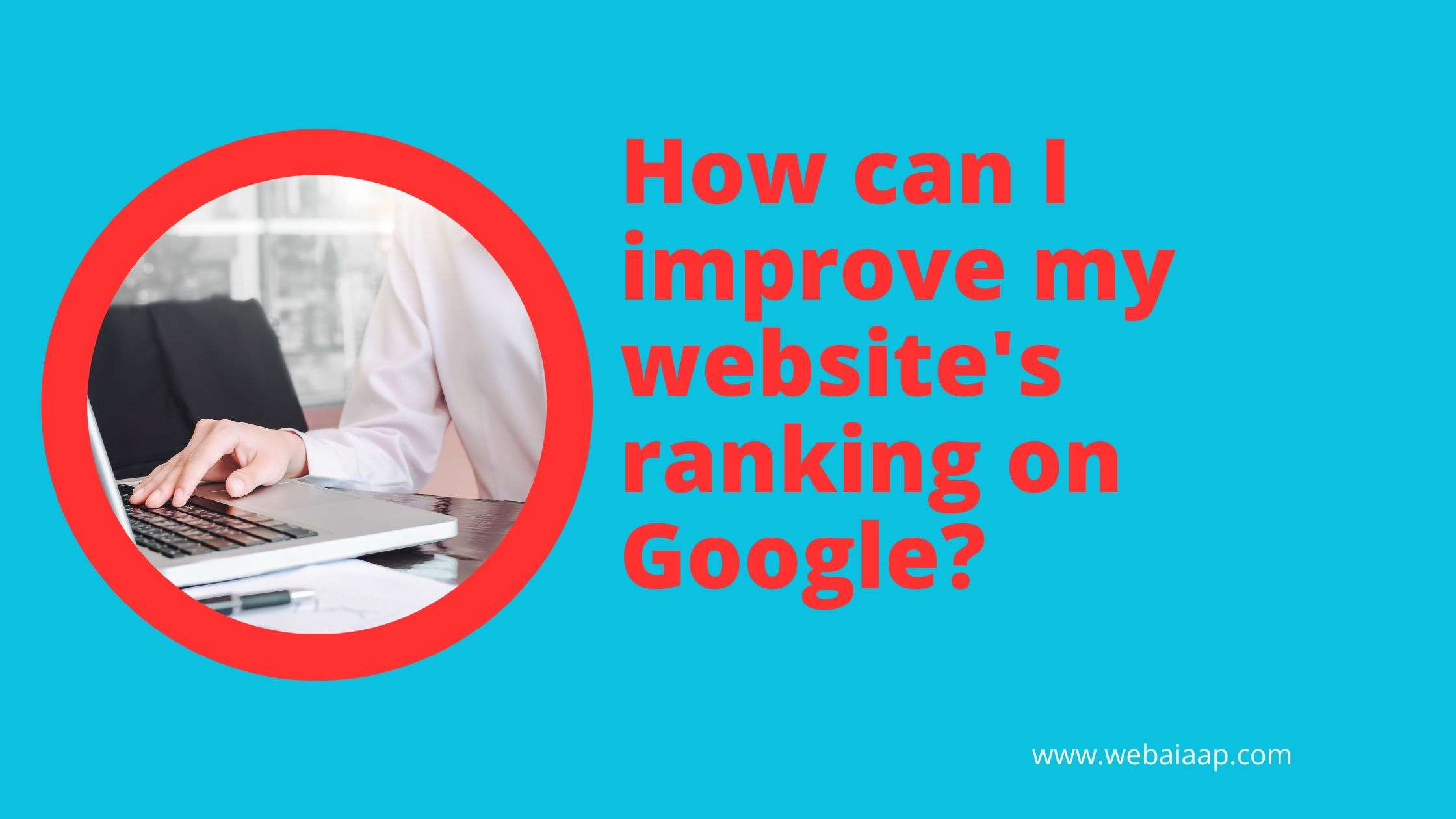How can I improve my website’s ranking on Google?
Introduction
In the current era of digital advancements, establishing a robust online presence holds immense importance for both businesses and individuals. Among various factors contributing to this presence, the visibility of your website on search engines, particularly Google, stands out as paramount.
This piece delves into efficacious tactics that can be employed to elevate your website’s ranking on Google, thereby guaranteeing its exposure to a broader spectrum of audience.
1. Comprehending the Factors that Impact Google’s Ranking Algorithm
Relevance of Content
Google’s algorithm centers around the importance of content relevance. Employ a strategic approach to incorporate targeted keywords, ensuring a harmonious blend of quality and quantity. Develop comprehensive content that effectively caters to user intent, fostering visitor engagement.
Website Performance
To enhance your website’s performance, concentrate on aspects like the speed at which pages load and ensuring mobile compatibility. Google gives preference to websites that offer a smooth user experience across various devices.
Backlinks
Building a diverse and high-quality link profile is crucial for effective SEO, as quality backlinks continue to play a pivotal role. It is important to prioritize the quality of the links rather than focusing solely on quantity. Regularly monitoring your backlinks is essential, as it allows you to identify and disavow any harmful links, ensuring the credibility and integrity of your website.
You may also read this article How to Create a High-Converting Landing Page for Local Businesses
2. Maximizing Online Visibility through Effective Keyword Research and Optimization
Importance of Keyword Research
Invest sufficient time in conducting comprehensive keyword research in order to identify relevant phrases that align with your content. It is crucial to incorporate both primary and long-tail keywords to effectively reach a wider audience.
On-Page Optimization
Construct engaging title tags and meta descriptions. Leverage header tags (H1, H2, H3) strategically to structure your content in a manner that communicates its significance to search engines.
3.Enhancing the Caliber of Content and Encouraging Engaging Connections.
Creating Valuable Content
Produce content that delivers value to your audience. Address their intent, seamlessly incorporate multimedia elements, and stay updated with industry trends to remain relevant.
User Engagement Metrics
Track user engagement metrics such as dwell time and bounce rate. Increased dwell times and decreased bounce rates are indicative of content relevance and user satisfaction.
4. Technical SEO Strategies for Improved Search Rankings
Website Structure
Establish a clean and logical website structure. Enhance URL structures and ensure the sitemap and robots.txt file are regularly updated.
Ensuring Website Security and Accessibility
Strengthen the security of your connection by implementing the HTTPS protocol, guaranteeing a secure browsing environment. Moreover, optimize your site for mobile devices to meet the demands of the expanding mobile user base.
5. Developing High-Grade Backlinks
Natural Link Building
Develop organic methods for building links, such as engaging in guest blogging and reaching out to influential individuals. Foster connections within your specific field to obtain genuine and valuable backlinks.
Monitoring Backlink Quality
It is essential to conduct periodic audits of your backlink profile. By disavowing any detrimental links, you can safeguard your website’s credibility and prevent any negative repercussions.
You may also read this article What is Jasper? And How does it work?-A complete guide!
6. Incorporating social media into various channels
Impact on Google Ranking
Leverage social media to enhance your online presence. Social signals contribute to your website’s credibility in the eyes of search engines.
7. Periodic Content Updates
Freshness Factor
Regularly refreshing your website with new content is crucial. By consistently adding blogs and news updates, you send a clear message to search engines that your site is dynamic and pertinent.
8. Assessing and Modifying: A Detailed Review
Google Analytics
Use Google Analytics to monitor the performance of your website. Examine user behavior and adjust your strategies according to the insights gained from the data.
SEO Audits and Updates
Regularly perform SEO audits to pinpoint areas that can be enhanced. Continuously stay updated on algorithm changes and make the necessary adjustments to your strategies.
Conclusion
In the constantly changing realm of online presence, enhancing your website’s position on Google is a continuous endeavor. By comprehending and executing the strategies mentioned, you will not only enhance the visibility of your site but also establish a lasting online existence.
You may also read this article Top 5 ChatGPT Alternatives in 2024 you should know
FAQs
1. How long does it take to see improvements in Google ranking?
The progress of your Google ranking can differ, however, by maintaining a steady effort, you might begin observing outcomes in a matter of weeks or months.
2. Are paid advertising and SEO interconnected for better results?
Integrating paid advertising with SEO can significantly boost overall visibility and traffic, despite their distinct purposes.
3. Can I solely rely on backlinks for better ranking?
Backlinks play a vital role, however, achieving sustained success requires a comprehensive strategy that encompasses content quality, technical SEO, and user engagement.
4. What role do social media signals play in SEO?
Social media signals, including likes and shares, play a significant role in enhancing the credibility of your website, thereby impacting its ranking on Google.
5. Is there a specific word count for SEO-optimized content?
When it comes to creating content, there is no specific guideline, but it is advisable to strive for comprehensive information that extensively covers the subject matter. Generally, the content should surpass 1000 words in order to provide a thorough exploration of the topic.

